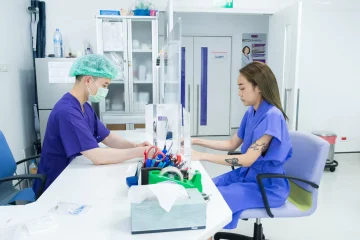When uterine lining tissue proliferates outside the uterus cavity, it is known as endometriosis, a chronic and frequently crippling illness. Abrupt bleeding, excruciating pain, and a host of other symptoms that greatly interfere with day-to-day functioning can result from this. Effective endometriosis care is essential for improving daily functioning and overall life quality. This article examines how endometriosis patients’ lives can be significantly improved by complete therapy of the illness.
What Is Endometriosis?
In the world, endometriosis is thought to afflict 1 in 10 women who are fertile. The condition can vary in severity, with symptoms ranging from mild to debilitating. Common symptoms include pelvic pain, painful menstruation, pain during intercourse, and infertility. Although the precise origin of endometriosis is still unknown, a mix of immune system, hormonal, and genetic variables are thought to be involved.
The Impact Of Endometriosis On Daily Life
The impact of endometriosis extends beyond physical pain. Many women experience emotional and psychological stress due to the chronic nature of the disease. The unpredictable pain can interfere with daily activities, including work, social interactions, and personal relationships. Furthermore, a worse quality of life and decreased productivity can result from the difficulty of treating symptoms.
Comprehensive Endometriosis Care: A Multidimensional Approach
Effective endometriosis care involves a multifaceted approach, combining medical treatments, lifestyle adjustments, and psychological support. Here’s how comprehensive care can enhance daily functioning and life quality:
1. Personalized Treatment Plans
Developing a treatment plan that is tailored to the individual requirements of each patient is an essential component of endometriosis care. In order to inhibit the growth of tissue that resembles endometrial tissue, hormone treatment and medicine for pain management may be used. In some cases, surgical interventions may be necessary to remove endometriosis lesions and adhesions. Individualized therapy programs are designed to cater to the distinct symptoms and concerns of every patient, resulting in enhanced quality of life and more efficient management.
2. Pain Management
Effective pain management is crucial in endometriosis care. Pain relief can significantly enhance daily functioning and overall well-being. This could entail a mix of prescription pharmaceuticals, including hormone treatments, nonsteroidal anti-inflammatory drugs (NSAIDs), and, in certain situations, opioids for extremely severe pain. Acupuncture, physical therapy, and relaxation techniques are examples of non-pharmacological methods that can also relieve symptoms and enhance day-to-day comfort.
3. Nutritional And Lifestyle Modifications
In order to control endometriosis symptoms, diet and lifestyle are important factors. Several women find relief by limiting processed foods and high sugar intake and switching to an anti-inflammatory diet high in fruits, vegetables, and whole grains. Additionally helpful in reducing symptoms and enhancing general well-being are regular exercise and stress-reduction methods like yoga and meditation. Integrating these lifestyle changes can enhance energy levels, reduce pain, and improve daily functioning.
4. Fertility Support
For women with endometriosis who experience infertility, specialized fertility care is crucial. Treatments such as assisted reproductive technologies (ART), including in vitro fertilization (IVF), can provide support and options for those struggling with conception. Addressing fertility concerns within the broader scope of endometriosis care helps improve the overall quality of life and addresses one of the significant emotional impacts of the condition.
5. Psychological And Emotional Support
It is important to recognize the emotional and psychological costs associated with endometriosis. Chronic pain and infertility can lead to feelings of frustration, anxiety, and depression. Having access to support groups and counseling might offer coping mechanisms and emotional relief. Mental health support is an integral part of comprehensive endometriosis care, helping individuals navigate the emotional challenges of living with a chronic condition.
6. Education And Awareness
Education about endometriosis is vital for both patients and healthcare providers. Patients are more able to take an active role in their care when they are informed about the illness, available treatments, and self-care techniques. Increased awareness among healthcare providers ensures timely diagnosis and appropriate treatment, reducing the delay and uncertainty often associated with endometriosis.
The Role Of Ongoing Care And Monitoring
Endometriosis care is not a one-time event but an ongoing process. Scheduling routine follow-up consultations with medical professionals guarantees that treatment plans are modified as necessary and that any new symptoms are swiftly handled. Ongoing care helps manage the condition effectively, minimizing flare-ups and maintaining an optimal quality of life.
Conclusion
Comprehensive endometriosis care plays a crucial role in improving daily functioning and overall life quality for those affected by the condition. By integrating personalized treatment plans, effective pain management, lifestyle modifications, fertility support, psychological care, and education, individuals with endometriosis can achieve significant improvements in their daily lives. A multimodal strategy that addresses the mental and physical aspects of the ailment can improve the quality of life and overall well-being of endometriosis patients.




